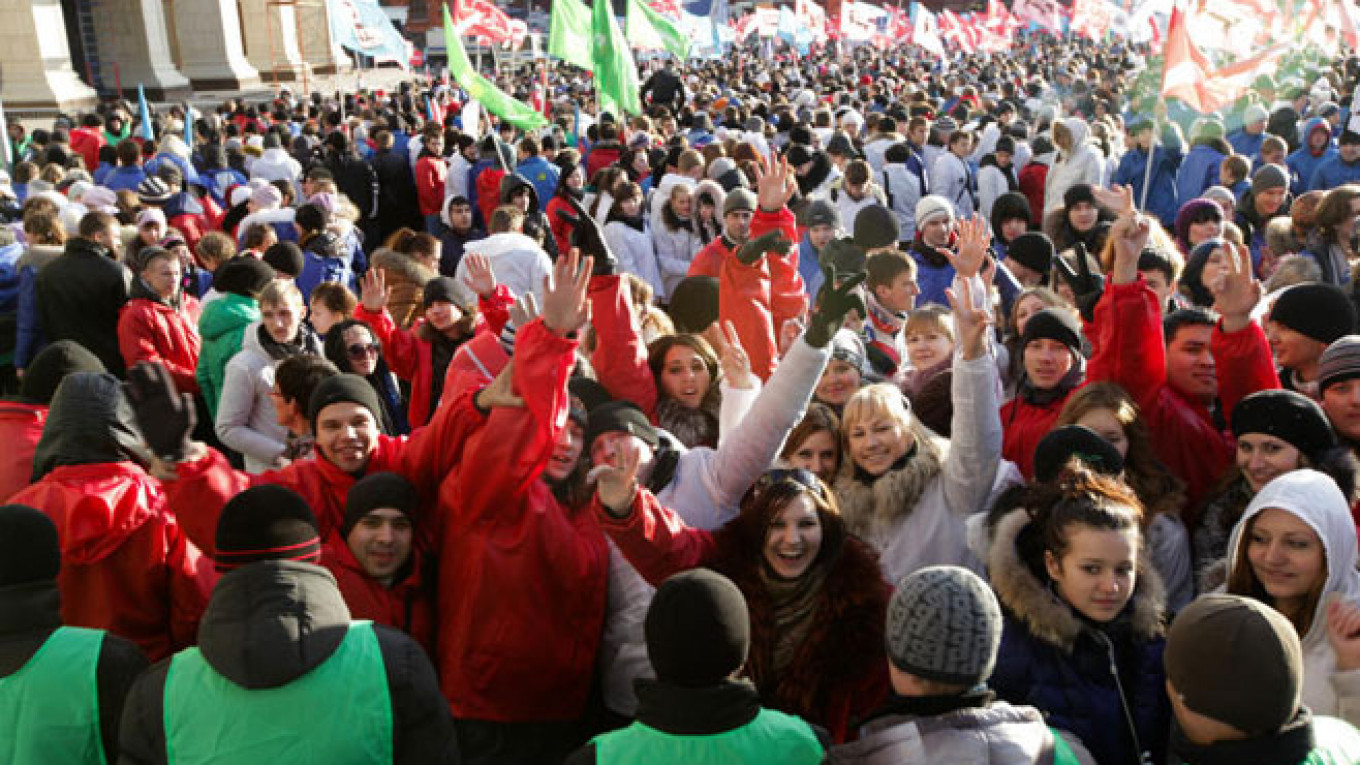President Vladimir Putin signaled a switch Thursday from the government's previous youth policy of aggressive political groups toward a more traditional approach to instilling patriotism.
"We need to give young people more knowledge about Russia's historical, cultural and natural riches back in school," Putin said. "This is, perhaps, the main way to make them learn to love their motherland and become useful to it," he told a group of government officials and heads of civil society groups in the Kremlin.
His comments suggested there was little likelihood of the resurrection of the abrasive Kremlin-manufactured youth groups that flourished in the last decade.
After Ukraine's Orange Revolution 10 years ago, in which young people emerged as a driving force for change through mass public protests, Moscow decided to create its own loyal youth movement to offer young people a framework for their political ambitions and — crucially — to counter-balance oppositional rallies in case of need.
The Nashi movement emerged as the brashest. Their often controversial belligerent campaigns included harassing foreign ambassadors and opposition figures, as well as organizing mass marches in support of Putin.
Putin demonstratively threw his support behind the movement by attending some of its annual large-scale camp congresses on the shores of Lake Seliger in the Tver region. The government's former chief ideologue, Vladislav Surkov — dubbed the "Kremlin demiurge" — managed the Nashi project as his personal brainchild.
But when the Russian government faced its own wave of simmering political activism at the end of 2011, Nashi failed to offer any alternative to the tens of thousands who gathered at anti-government rallies in central Moscow. Since then, Nashi has almost disappeared from the headlines.
The organization's press secretary Anastasia Fedorenchik said Thursday that the movement "is not doing much now, but still officially exists today."
Several former Nashi activists declined to comment for this report, while one of its main leaders, Sergei Belokonev, told The Moscow Times that he "had no memory of what had happened." Nashi's founder and main ideologist Vasily Yakemenko had not responded to an interview request by the time of publication.
One of the main problems, according to analysts, was that Nashi never succeeded at making themselves genuinely fashionable and hip among the young.
"The problem with Nashi and Surkov's policy overall was that it aimed at attracting conformist people by using avant-garde formats: performances, slogans, actions," said Alexei Makarkin, deputy head of the Center of Political Technologies think tank in Moscow.
After Nashi's failure, the government appeared to abandon the idea that it could attract mainstream urban youth to its ranks. Instead, it began targeting the politically inert and conservative by offering them niche projects, such as battling illegal parking in city centers or raiding supermarkets for expired food items.
"Today the message is that the form must correspond to the meaning, so the policy is more direct and much less ambitious. [Vyacheslav] Volodin, the new ideologist, is more of a pragmatic realist, rather than the enigmatic intellectual that Surkov was," Makarkin said.
Surkov, who is known for his love for Allen Ginsberg's conceptual poetry and gangsta rap, was a creative ideologist, while now is a time for effective functionaries, which is reflected in the youth policy, the analyst said.
In addition to failing to create an attractive brand, the previous youth policy also failed to provide its adherents with the political careers that they sought. A notable exception is Maxim Mishenko, who was one of the main activists of the Rossia Molodaya movement before becoming its current leader and a State Duma deputy.
"Our youth policy was too politicized, the movements were all political and never represented the majority of young people," he said in a phone interview.
Rossia Molodaya was one of Nashi's rivals, which caused the two to compete "to produce the most eccentric campaign," he said.
"Today the idea is that there should be less politics and more concrete actions, but young people still need a dream, a certain image of the future," he said with nostalgia in his voice.
Contact the author at i.nechepurenko@imedia.ru
A Message from The Moscow Times:
Dear readers,
We are facing unprecedented challenges. Russia's Prosecutor General's Office has designated The Moscow Times as an "undesirable" organization, criminalizing our work and putting our staff at risk of prosecution. This follows our earlier unjust labeling as a "foreign agent."
These actions are direct attempts to silence independent journalism in Russia. The authorities claim our work "discredits the decisions of the Russian leadership." We see things differently: we strive to provide accurate, unbiased reporting on Russia.
We, the journalists of The Moscow Times, refuse to be silenced. But to continue our work, we need your help.
Your support, no matter how small, makes a world of difference. If you can, please support us monthly starting from just $2. It's quick to set up, and every contribution makes a significant impact.
By supporting The Moscow Times, you're defending open, independent journalism in the face of repression. Thank you for standing with us.
Remind me later.






